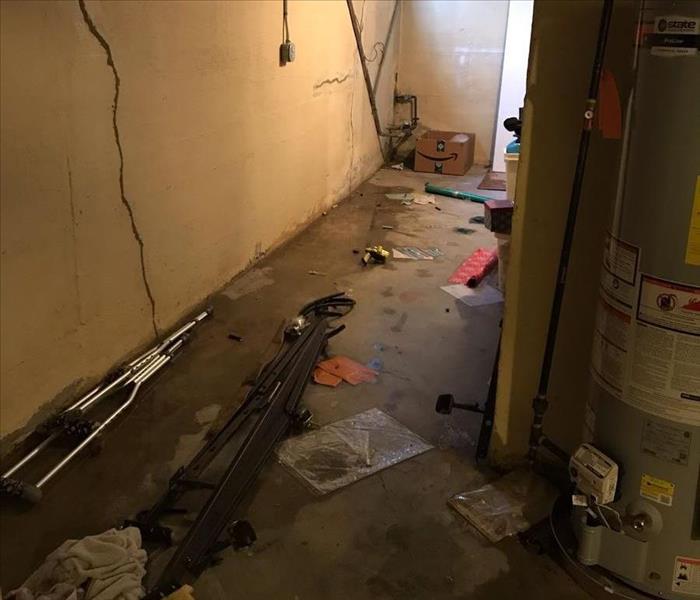What to Do If a Water Heater Bursts: Causes and Prevention Tips
4/18/2022 (Permalink)
Did you know that about 10% of our water damage calls are related to burst water heaters?
All property owners know that a water heater is a costly investment, and it's essential to take care of it to help it last as long as possible. The average lifespan of a hot water heater depends on if it is gas or electric.
An electric hot water heater will last anywhere from ten to fifteen years, while a gas hot water heater will last roughly eight to twelve years. Of course, with proper maintenance, your water heater can last even longer. However, sometimes water heaters just break down and need to be replaced.
One of the most unfortunate things to occur in a home is when a water heaters bursts, which can happen at any time and will likely cause severe water damage to your home.
If your water heater bursts, you may not know what to do, but don't worry! This blog post will go over the causes of water heater bursts and prevention tips to help keep your home safe.
3 Causes of a burst hot water heater
There are many different reasons that a water heater can burst, but here are three of the most common causes:
- Sediment build-up: Sediment build-up can cause a water heater to burst because it puts stress on the tank. As water is heated and then cooled, minerals such as calcium and magnesium can settle at the bottom of the tank. Over time, this sediment build-up can cause the water heater tank to crack or even burst.
- Corrosion: Corrosion can cause a water heater to burst because it weakens the tank. Over time, the metal in the tank will start to corrode due to exposure to water and oxygen. Corrosion can cause the tank to become structurally weak and eventually lead to a rupture.
- Excess internal pressure: Too much internal pressure can cause a water heater to burst. Excess pressure can happen when the temperature and pressure relief valve (T&P valve) is not working correctly or the tank is too full. When there is too much pressure in the tank, it can cause the tank to rupture.
3 Prevention tips
Now that we know some of the causes of a water heater bursting, let's go over some prevention tips:
- Drain the tank regularly: Draining the tank helps to remove sediment build-up. We recommend draining your water heater tank at least once a year. You can do this by attaching a hose to the drain valve and draining the water into a bucket or drain.
- Check the T&P valve: The T&P valve is a safety feature that releases pressure and prevents the tank from bursting. It's important to check this valve regularly to ensure it is working correctly. You can check the valve by lifting up the handle to see if water comes out. If water does not come out, the valve needs to be replaced.
- Don't overfill the tank: Be sure not to overfill the tank beyond the manufacturer's recommended level; it could cause excess pressure and make the tank more likely to burst if you do.
What to do if your water heater bursts?
If your water heater bursts, it's essential to know what to do. The following is what the professionals at SERVPRO of East Dayton/Beavercreek recommend:
Shut off the water: The first thing you need to do is shut off the water to the tank. Shutting off the water will help to prevent any further water damage.
Turn off the power: If the water heater is electric, be sure to turn off the power at the breaker box. If it is gas, then turn off the gas supply.
Drain the tank: Once the water and power are shut off, you can start to drain the tank. Attach a hose to the drain valve and open it up. Drain the water into a bucket or drain.
Call a water restoration company: Once the water is drained, it's time to call a water restoration company for help. The right company will be able to clean and repair any water damage.
Final thoughts
We hope you found this blog post on water heaters helpful. If you have any questions or need water damage restoration services, please contact us immediately!
The professionals at SERVPRO of East Dayton/Beavercreek are highly trained and certified by the IICRC in water damage restoration. We have the experience and knowledge to get your home or business back to pre-water damage condition. We understand that water damage can be stressful; that's why we will work with you to make the process as smooth as possible.



 24/7 Emergency Service
24/7 Emergency Service